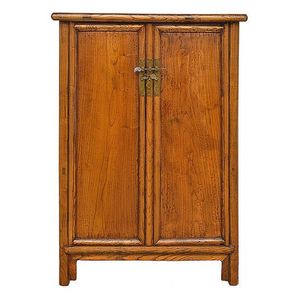French Oak Side Cabinet with Drawers and Doors
You must be a subscriber, and be logged in to view price and dealer details.
Subscribe Now to view actual auction price for this item
When you subscribe, you have the option of setting the currency in which to display prices to $Au, $US, $NZ or Stg.
- Frieze - An architectural term denoting the flat, shaped or convex horizontal surface of furniture, between the architrave and the cornice, usually found on a cabinet or bookcase, or on desks and tables where it may include drawers, the area between the top and the legs. In ceramics, the term refers to the banding, of usually a repeating pattern, on the rims of plates and vases.
- Oak - Native to Europe and England, oak has been used for joinery, furniture and building since the beginning of the medieval civilisation. It is a pale yellow in colour when freshly cut and darkens with age to a mid brown colour.
Oak as a furniture timber was superceded by walnut in the 17th century, and in the 18th century by mahogany,
Semi-fossilised bog oak is black in colour, and is found in peat bogs where the trees have fallen and been preserved from decay by the bog. It is used for jewellery and small carved trinkets.
Pollard oak is taken from an oak that has been regularly pollarded, that is the upper branches have been removed at the top of the trunk, result that new branches would appear, and over time the top would become ball-like. . When harvested and sawn, the timber displays a continuous surface of knotty circles. The timber was scarce and expensive and was used in more expensive pieces of furniture in the Regency and Victorian periods. - Bevel / Chamfer - In furniture making, a chamfered corner refers to a technique used to create a smooth, angled edge on the corner of a piece of furniture. This is typically done by cutting away a small portion of the corner at an angle, typically 45 degrees, creating a diagonal edge, rather than a sharp 90-degree angle. This technique can be used on various parts of a piece of furniture such as table legs, drawer fronts, or door frames. Chamfering can add visual interest to a piece and can help to soften the overall look of a piece of furniture. It is often used in conjunction with other techniques, such as rounding edges or using contrasting wood species to create a more elegant, sophisticated look. Chamfering is a simple way to add a touch of elegance to a piece of furniture and it is a common technique used by furniture makers.
This item has been included into following indexes:
Visually similar items

A French provincial style oak three door dresser base with three frieze drawers, block supports, 161 x 106.5 x 46 cm

A Chinese elm Shangxi cabinet late 19th century the canted rectangular body with two doors, square supports, 89 x 134.5 x 45.5 cm, accompanied by a certificate of authenticity

A Victorian grain painted 2 door wardrobe, circa 1860, 163 cm high, 102 cm wide, 60 cm deep

A George II provincial oak corner cabinet, circa 1740, 95 cm high, 62 cm wide, 40 cm deep
